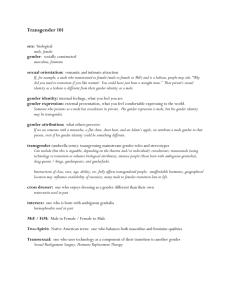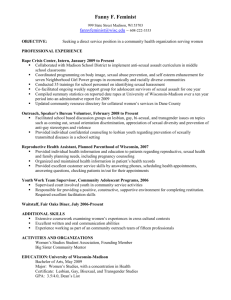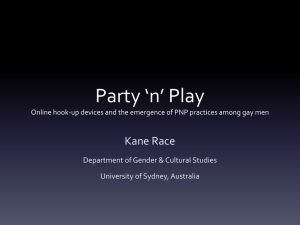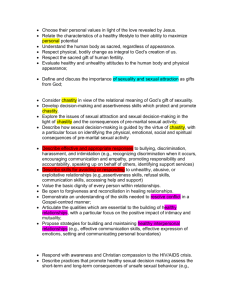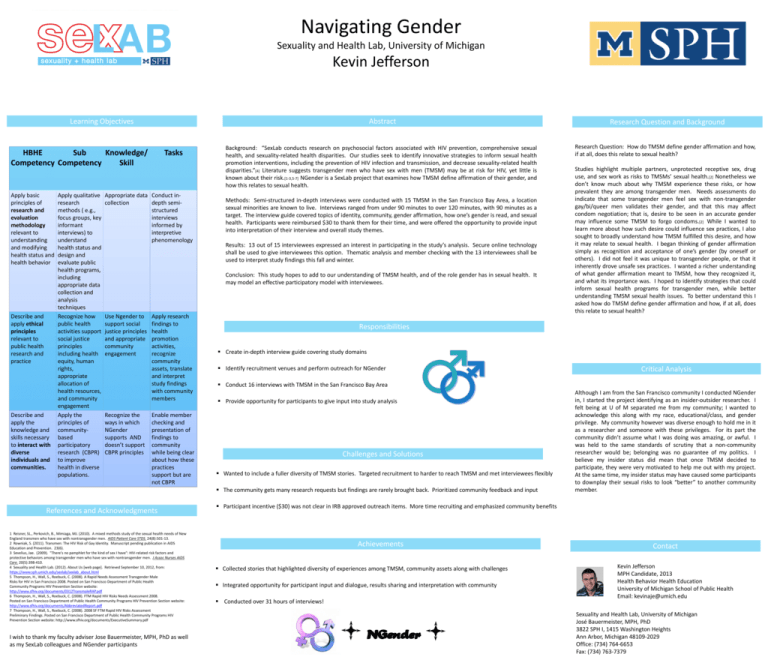
Navigating Gender
Sexuality and Health Lab, University of Michigan
Kevin Jefferson
Abstract
Learning Objectives
HBHE
Sub
Knowledge/
Competency Competency
Skill
Apply basic
principles of
research and
evaluation
methodology
relevant to
understanding
and modifying
health status and
health behavior
Describe and
apply ethical
principles
relevant to
public health
research and
practice
Describe and
apply the
knowledge and
skills necessary
to interact with
diverse
individuals and
communities.
Apply qualitative
research
methods ( e.g.,
focus groups, key
informant
interviews) to
understand
health status and
design and
evaluate public
health programs,
including
appropriate data
collection and
analysis
techniques
Recognize how
public health
activities support
social justice
principles
including health
equity, human
rights,
appropriate
allocation of
health resources,
and community
engagement
Apply the
principles of
communitybased
participatory
research (CBPR)
to improve
health in diverse
populations.
Tasks
Appropriate data Conduct incollection
depth semistructured
interviews
informed by
interpretive
phenomenology
Background: “SexLab conducts research on psychosocial factors associated with HIV prevention, comprehensive sexual
health, and sexuality-related health disparities. Our studies seek to identify innovative strategies to inform sexual health
promotion interventions, including the prevention of HIV infection and transmission, and decrease sexuality-related health
disparities.”[4] Literature suggests transgender men who have sex with men (TMSM) may be at risk for HIV, yet little is
known about their risk.[1-3,5-7] NGender is a SexLab project that examines how TMSM define affirmation of their gender, and
how this relates to sexual health.
Methods: Semi-structured in-depth interviews were conducted with 15 TMSM in the San Francisco Bay Area, a location
sexual minorities are known to live. Interviews ranged from under 90 minutes to over 120 minutes, with 90 minutes as a
target. The interview guide covered topics of identity, community, gender affirmation, how one’s gender is read, and sexual
health. Participants were reimbursed $30 to thank them for their time, and were offered the opportunity to provide input
into interpretation of their interview and overall study themes.
Results: 13 out of 15 interviewees expressed an interest in participating in the study’s analysis. Secure online technology
shall be used to give interviewees this option. Thematic analysis and member checking with the 13 interviewees shall be
used to interpret study findings this fall and winter.
Conclusion: This study hopes to add to our understanding of TMSM health, and of the role gender has in sexual health. It
may model an effective participatory model with interviewees.
Use Ngender to
support social
justice principles
and appropriate
community
engagement
Recognize the
ways in which
NGender
supports AND
doesn’t support
CBPR principles
Apply research
findings to
health
promotion
activities,
recognize
community
assets, translate
and interpret
study findings
with community
members
Enable member
checking and
presentation of
findings to
community
while being clear
about how these
practices
support but are
not CBPR
1 Reisner, SL., Perkovich, B., Mimiaga, MJ. (2010). A mixed methods study of the sexual health needs of New
England transmen who have sex with nontransgender men. AIDS Patient Care STDS. 24(8):501-13.
2 Rowniak, S. (2011). Transmen: The HIV Risk of Gay Identity. Manuscript pending publication in AIDS
Education and Prevention. 23(6).
3 Sevelius, Jae. (2009). "There's no pamphlet for the kind of sex I have": HIV-related risk factors and
protective behaviors among transgender men who have sex with nontransgender men. J Assoc Nurses AIDS
Care. 20(5):398-410.
4 Sexuality and Health Lab. (2012). About Us [web page]. Retrieved September 10, 2012, from:
https://www.sph.umich.edu/sexlab/sexlab_about.html
5 Thompson, H., Wall, S., Roebuck, C. (2008). A Rapid Needs Assessment Transgender Male
Risks for HIV in San Francisco 2008. Posted on San Francisco Department of Public Health
Community Programs HIV Prevention Section website:
http://www.sfhiv.org/documents/0312TransmaleRAP.pdf
6 Thompson, H., Wall, S., Roebuck, C. (2008). FTM Rapid HIV Risks Needs Assessment 2008.
Posted on San Francisco Department of Public Health Community Programs HIV Prevention Section website:
http://www.sfhiv.org/documents/AbbreviatedReport.pdf
7 Thompson, H., Wall, S., Roebuck, C. (2008). 2008 SF FTM Rapid HIV Risks Assessment
Preliminary Findings. Posted on San Francisco Department of Public Health Community Programs HIV
Prevention Section website: http://www.sfhiv.org/documents/ExecutiveSummary.pdf
I wish to thank my faculty adviser Jose Bauermeister, MPH, PhD as well
as my SexLab colleagues and NGender participants
Research Question: How do TMSM define gender affirmation and how,
if at all, does this relate to sexual health?
Studies highlight multiple partners, unprotected receptive sex, drug
use, and sex work as risks to TMSMs’ sexual health.[2] Nonetheless we
don’t know much about why TMSM experience these risks, or how
prevalent they are among transgender men. Needs assessments do
indicate that some transgender men feel sex with non-transgender
gay/bi/queer men validates their gender, and that this may affect
condom negotiation; that is, desire to be seen in an accurate gender
may influence some TMSM to forgo condoms.[2] While I wanted to
learn more about how such desire could influence sex practices, I also
sought to broadly understand how TMSM fulfilled this desire, and how
it may relate to sexual health. I began thinking of gender affirmation
simply as recognition and acceptance of one’s gender (by oneself or
others). I did not feel it was unique to transgender people, or that it
inherently drove unsafe sex practices. I wanted a richer understanding
of what gender affirmation meant to TMSM, how they recognized it,
and what its importance was. I hoped to identify strategies that could
inform sexual health programs for transgender men, while better
understanding TMSM sexual health issues. To better understand this I
asked how do TMSM define gender affirmation and how, if at all, does
this relate to sexual health?
Responsibilities
Create in-depth interview guide covering study domains
Identify recruitment venues and perform outreach for NGender
Critical Analysis
Conduct 16 interviews with TMSM in the San Francisco Bay Area
Provide opportunity for participants to give input into study analysis
Challenges and Solutions
Wanted to include a fuller diversity of TMSM stories. Targeted recruitment to harder to reach TMSM and met interviewees flexibly
The community gets many research requests but findings are rarely brought back. Prioritized community feedback and input
References and Acknowledgments
Research Question and Background
Although I am from the San Francisco community I conducted NGender
in, I started the project identifying as an insider-outsider researcher. I
felt being at U of M separated me from my community; I wanted to
acknowledge this along with my race, educational/class, and gender
privilege. My community however was diverse enough to hold me in it
as a researcher and someone with these privileges. For its part the
community didn’t assume what I was doing was amazing, or awful. I
was held to the same standards of scrutiny that a non-community
researcher would be; belonging was no guarantee of my politics. I
believe my insider status did mean that once TMSM decided to
participate, they were very motivated to help me out with my project.
At the same time, my insider status may have caused some participants
to downplay their sexual risks to look “better” to another community
member.
Participant incentive ($30) was not clear in IRB approved outreach items. More time recruiting and emphasized community benefits
Achievements
Collected stories that highlighted diversity of experiences among TMSM, community assets along with challenges
Integrated opportunity for participant input and dialogue, results sharing and interpretation with community
Conducted over 31 hours of interviews!
Contact
Kevin Jefferson
MPH Candidate, 2013
Health Behavior Health Education
University of Michigan School of Public Health
Email: kevinaje@umich.edu
Sexuality and Health Lab, University of Michigan
José Bauermeister, MPH, PhD
3822 SPH I, 1415 Washington Heights
Ann Arbor, Michigan 48109-2029
Office: (734) 764-6653
Fax: (734) 763-7379

